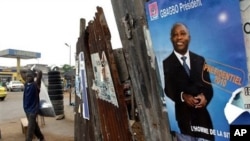Election observers in Ivory Coast are preparing for Sunday's presidential vote. Local and international observers will monitor a poll that is meant to reunite the country after a decade of political and military turmoil.
European Union observers met for a final briefing before taking up positions across the country.
European Parliament member Christian Preda, who leads the observer mission, says the European Union has had 32 election observers in place since October 15. The teams taking up positions today will visit a cross-section of polling stations in 17 regions to monitor preparations for the vote, the distribution of voter cards, candidate campaigning and the role of the media in covering the campaign.
The EU mission will announce its preliminary findings on the fairness of the poll within two days of Sunday's vote and will keep some observers in Ivory Coast during the post-electoral period as well.
The United Nations observer mission and the Economic Community of West African States will also monitor this vote, along with 34 local civil society groups registered with the electoral commission as official observers.
Marie Paule Kodjo, who runs the nonprofit Women's Committee for Elections and Reconstruction, says her group's volunteers have taught voters across the country how to mark their ballots. For example, she says they are telling voters to mark only within the box under their candidate and not to fold the ballot, as the ink could mark the other side of the page and make the ballot invalid.
Ten years ago, about 18 percent of ballots were declared invalid. Kodjo says the goal for this vote is to see the number of spoiled ballots below ten percent.
Nane Amelie Kipre says the group's observers have been trained to remain neutral.
On poll day, Kipre says observers will watch for any disruptions and work to promote a peaceful environment. She says sometimes when people see your electoral card, they categorize you. Kipre says someone wearing a traditional boubou might be assumed to be a supporter of Alassane Ouattara, so observers will watch for any prejudicial treatment.
Ouattara is one of the three leading candidates in this vote along with current President Laurent Gbabgo and former president Henri Konan Bedie. If no one wins a simple majority Sunday there will be a second round run-off in late November.
Voter turnout is not only important for the candidates. It reflects the level of public support for an electoral process that has been repeatedly delayed since 2005.
Volunteers from the Women's Committee for Elections and Reconstruction are encouraging people to go to the polls.
Volunteer Pierre Octave Guede says some people are apathetic about the candidates and others only registered to vote to get a national identity card. He says the right to vote is more important than an identity card. He is troubled by young people in his neighborhood who say they just wanted the ID card and do not care about voting. That, he says, is a problem.
Election Observers Prepare for Sunday's Ivory Coast Vote




